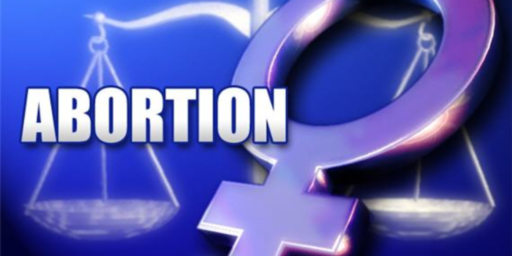The Confirmation Equivalent of the 5th Amendment
Kevin Drum, chagrined that Supreme Court nominees sidestep most questions from the Senate on the grounds that it might prejudice their opinion in a future case, observes,
In a remarkable evolution of democracy, we have now entered an era in which candidates for the Supreme Court are allowed to glide through their hearings without once giving a straight answer about anything having to do with the laws or constitution of the United States. After all, Supreme Court justices might conceivable rule on anything in the future. It’s yet another sign that the separation of powers envisioned by the founders has slowly morphed into a de facto parliamentary system — except without any of the institutional means of accountability normally built into a parliamentary system. Someday Congress is going to regret that.
While there’s little doubt that Congress has allowed its power to erode in favor of both the Executive and Judicial branches, this doesn’t strike me as an example of that. For one thing, judicial nominees have been defeated much more frequently in recent years than in the early days of the Republic, when the powers of the legislature were at their highest. More importantly, nominees seldom attempt to deflect questions about their judicial philosophy. Certainly, to take the most recent case to go through the entire process, John Roberts didn’t.
The combination of the intense polarization of the abortion issue, the perfection of the fundraising machinery of both parties, and the live televising of judicial hearings creates a feeding frenzy where Senators are even more inclined to make asses of themselves than usual. They trip all over themselves grandstanding on the abortion issue, trying to trap nominees infinitely brighter than themselves with parlor tricks. Nominees have little choice but to respectfully dodge issues on specific cases that are outside the realm of settled law. The fact that abortion cases keep making their way to the SCOTUS docket would seem proof that the issue is very much alive.
Declining to answer questions “on the grounds that the issue might come before me were I to be nominated” is the judicial equivalent of taking the 5th. It is much more friendly than, “You know damned well that I can’t answer that, you moron.”






While I’ll bet that’s true, I wonder if there’s any way to check to see if more candidates (then or now) get bounced because they’re not qualified (like Meiers) or because their political views/baggage aren’t acceptable to enough people in the Senate (like Bork)…
I just don’t think the dodge works for a justice, who will have the power to change the law (excuse me, “how the law is interpreted”).
Saying that you believe Roe and Casey were well or poorly-reasoned opinions is not the same as declaring in advance whether you’d affirm or overturn them. In theory, at least, there are other arguments that you might consider that would sway you more powerfully.
But so long as the Senate cares more about advancing party interests than about protecting its prerogative of “advice and consent,” such dodges will be tolerated.
The nominees are a lot smarter than those asking the questions. I don’t blame them for not providing a straight answer, after those asking the questions are masters at not answering a question. It’ almost poetic justice. In fact what needs to happen is for some nominee to tell those, who ask the dumb questions, to “take this job and shove it” and have the tune played on the PA system while doing it.
As I watched Kennedy today give his song and dance anti people rehtoric, I was constsntly reminded of how Kennedy let Mary Jo die in his car while he walked off in a drunked stupor, then with money and power got off scott free. What a hypocryte and slime ball.
Kennedy, Schumer, Lahey, and the rest of the left wing, self serving liars don’t deserve a straight answer on anything, They don’t pass the “Truth Test”.
The whole notion that judges shouldn’t declare what they think the law is is utterly ridiculous. It’s important that they don’t prejudge, say, criminal cases prior to hearing the case, but ruling on the law is completely different from ruling on a case.
This entire thing about not declaring what they really think is NOT RIDICULOUS.
What the democrats fear is that someone like themselves will be confirmed and overturn the laws they got from activitist judges they promoted to get the laws they couldn’t pass in the legislature or other legitimate ways.
Who needs argument when you’ve got Caps Lock?
snide
Hmmm…
If only Roger Taney could’ve been Borked. Maybe it isn’t such a bad idea after all…
Well, it’s one thing to say some particular case wasn’t ‘well-argued’. That implies the outcome might have been different if one side had better (or worse) representation, and that’s pretty logical. The problem is when someone believes a particular legal principle is in doubt, such as a fundamental right to privacy, abortion, whatever hot-button issue… _that’s_ pre-judging something.
Of course, there’s also the issue of whether or not you think the nominee is lying out his ass, but that’s a different debate 🙂
It wasn’t until recently in our history that these nominees subjected themselves to these nonsensical questions of the committee. Previously, other witnesses appeared. (Is Kennedy really only semi-functional or was he drunker than Otis Campbell?)
‘Is Kennedy really only semi-functional or was he drunker than Otis Campbell?’
I’m going with the first one as a long term result of the second one. He should really consider retirement since it’s really not conceivable that he’d be able to serve another term.